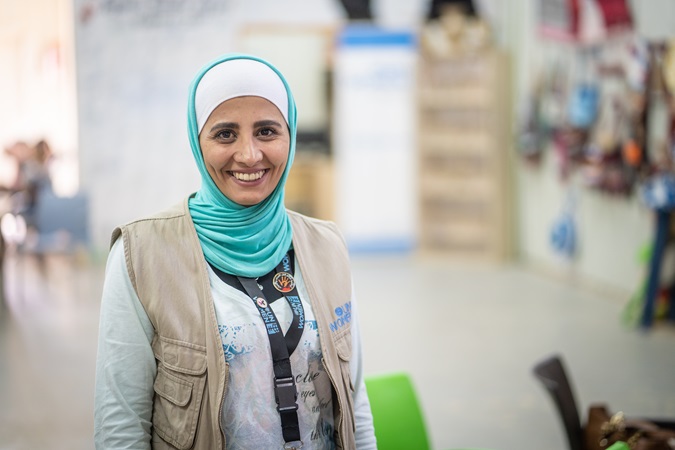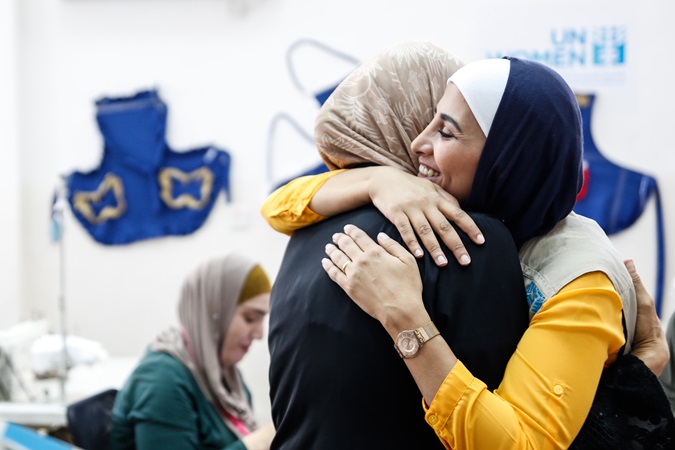A soul impassioned by supporting women
Date:
Originally published on UN Women Jordan’s website.

Rawan Majali, 36, is the UN Women Field Officer leading project activities for the 12 UN Women Oasis Centres for the Resilience and Empowerment of Women and Girls in Jordan. She joined UN Women in 2017, with a strong drive to empower women and advocate for gender equality.
It’s 10 a.m. and after a two-hour drive, Rawan Majali arrives at her destination: the small, sandy UN Women Oasis Centre in Taibeh, perched atop the sprawling rural hills of the Karak district. Here, as the melodious sounds of music stream out from behind the spartan walls, Rawan jumps straight from the car to partake in traditional dancing alongside the 10 Syrian and Jordanian women already stomping their feet in tune.
Rawan is immersed in the gyrating group of women, beaming through the swathe of movement as she grabs the women’s hands to throw them up in air and back down again. Ululations and applause fill the room as the song comes to an end.
“My day-to-day routine at work differs, but one thing that remains on my to-do list every day is making the women smile,” says Rawan. “For me, it is not just about turning up to work. For me, it is striving for my passion to empower women.”
Rawan was born in Jordan, in the Governorate of Amman. From a young age, she volunteered for multiple organizations while pursuing her Bachelor’s in English at Balqa University. Rawan then moved to the rural Governorate of Karak to raise her two children, now aged 6 and 8, where she would spend hours playing with them in their family olive groves.
While living in Karak, Rawan also volunteered with Caritas on a women’s empowerment project.
“We are all humans and we should support each other,” she says. “This sentiment ultimately drove me to work within the humanitarian and development sector.”
Rawan returned to Amman four years ago with her family, to pursue her career and obtain her Master’s degree in Management and Business. She joined UNDP as a Livelihood Assistant for three years before joining UN Women in 2017 as a camp assistant in the UN Women Oasis centres.
“Every day, I would listen to women's stories of hardship and war. I would hear their pain, see their tears, and yet they were standing in front of me ready to change their lives. Seeing their resilience made me realize the importance of UN Women's Oasis centres in their lives and my role in helping to empower them.”
Today, Rawan frequently returns to Karak as part of her work within host communities. Being a field officer involves a four-day week of tiresome travel across Jordan to manage all project activities in the 12 UN Women Oasis centres, which provide Syrian and Jordanian women and girls with access to livelihood opportunities, protection services, education and leadership training.
She always needs to be ready to listen to and support women. Today, it's a woman distraught and overcome with emotion as she explains that she will need to leave the programme because she cannot afford to pay for the specialized care school, the only one available locally for her disabled daughter. Rawan embraces her.
“There is a solution for everything,” Rawan says reassuringly, staring into the woman's teary eyes.
Rawan helped the woman create a savings calendar and allowed her daughter to access the free childcare services within the Oasis. Her daughter now attends specialized schooling half-days, thanks to her mother’s savings, and she continues to use the free childcare services in the afternoon. One childcare provider is assigned as her daughter’s shadow teacher to provide the assistance she needs and she is now actively engaging with the other children.
“As a woman, a mother and a sister, I understand the importance of other women’s needs and challenges,” says Rawan. “My children mean everything to me, so I could understand where this woman was coming from.”

Since 2012, UN Women has expanded its Oasis model to four centres in Za'atari and Azraq refugee camps and, in late 2018, Rawan helped establish an additional eight new centres in host communities, in partnership with the Ministry of Social Development.
“The eight new Oasis centres will allow Syrian refugees living in host communities and vulnerable Jordanian women and girls alike to have an opportunity to access relevant technical and vocational skills that can make a massive difference in their lives,” says Rawan.
Arriving at the centres, she is always greeted with bright smiles and embraces from the women. She has spent the past nine months setting up these pilot centres, from filling empty rooms with sewing machines, to plastering childcare spaces with colourful and engaging stickers, to interviewing the women enrolling in the programme.
“I have encountered more than 2,000 women during my work over the past two years. From every woman I have learned something new. They have become my role models and inspired me to work harder. My favourite part of my job is seeing how far women have come. I see them from the day they walk in. Today, women still come and find me even after they have left the Oasis. I see women who have graduated on to have their own business, find work and – most importantly – I see women that truly feel empowered.”

UN Women’s Oases are generously supported by the Governments of Australia, Finland, France, Iceland, Italy, Japan and the European Union through its Regional Trust Fund in Response to the Syria crisis (Madad Trust Fund), as well as by the Zonta International Foundation and UN Women National Committees.
“My soul is connected to the field,” says Rawan. “My message for women is to believe in yourself: we are leaders by nature, role models by nature. We have the power to change the world."